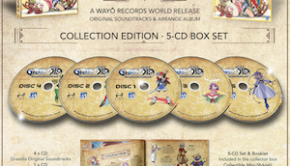ensemble 3
 |
Album Title: ensemble 3 |
| Record Label: N/A |
|
| Catalog No.: IRCD-003 |
|
| Release Date: August 14, 2016 |
|
| Purchase: Buy Used Copy |
Overview
ensemble 3 is the third collaborative effort between Noriyuki Iwadare and violinist Reiko Tsuchiya. Released during Comiket 90, it features tunes composed by both artists and cooperatively arranged. How does this work compare to the previous albums?
Body
The album opens up with Noriyuki Iwadare’s “Silk,” a homey, rustic, and warm piece that features a beautiful melody and has a bit of a Celtic sound to it. His next contribution, “Alph,” is a playful tune focusing on acoustic guitar, jazzy piano lines, and accordion that lends itself to giving the piece a Spanish flavor. The end result is quite excellent. “Hot Gale” is an airy and adventurous tune that gives off a sense of freedom. There are some rustic qualities to the piece and the violin and accordion are nice touches. “Bridge of Dream” has more of a pop sound to it that features a beautiful melody and is done in a ballad style. Lastly, Iwadare’s “Blue Night” is a relaxing and calm piano and strings driven piece that has a very romantic feel to it while also showcasing the melody’s beauty.
Reiko Tsuchiya’s “Eternal Green” is a more pensive and melancholy tune focusing on strings and piano that also features a beautiful melody. With “Puzzle,” Tsuchiya is able to create a piece that reminds me of Hideki Sakamoto’s echochrome compositions, with its reflective violin-led melody and beautiful progression. “Doze” is a violin and recorder piece that gives off a bit of a Renaissance feel and a nostalgic air with some waltz influence as well. The melody itself is quite beautiful, but I find the recorder to be an intriguing instrument choice, due to its love/hate nature. A personal favorite is “Demon Fire,” a very classically influenced piece with frenetic strings work that help give the piece a sense of mystery and omen. The end result is quite haunting. lastly, “Field Enthusiasts” is a reflective piece with vocals that help contribute to a somewhat cinematic tone. The erhu gives off an Asian vibe. The resulting piece is a bit magical and reminds me of something one might here in a Chinese film.
Summary
ensemble 3 is certainly one of the stronger albums released by the duo. There is a lot of range in the pieces with Noriyuki Iwadare offering a lot of variety in his contributions and Reiko Tsuchiya going for a more classical approach that complements the upbeat nature of many of Iwadare’s contributions. For fans of the first two albums, this one will certainly be welcome in your collection.
Do you agree with the review and score? Let us know in the comments below!
4.5
Posted on September 1, 2016 by Don Kotowski. Last modified on September 1, 2016.














